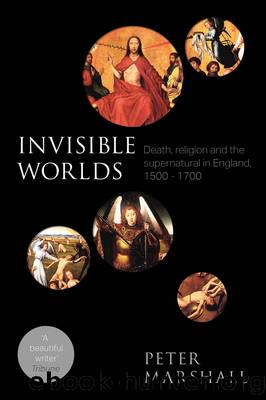Invisible Worlds by Peter Marshall

Author:Peter Marshall [Marshall, Peter]
Language: eng
Format: epub
Tags: History, Europe, Renaissance, Religion, Christian Church, Christian Theology, Angelology & Demonology
ISBN: 9780281075225
Google: Yv5GzgEACAAJ
Publisher: InterVarsity Press
Published: 2017-08-17T16:13:54+00:00
II
Ghosts were thus a very multivocal instrument of theological controversy and polemic. But on this issue reformers could not simply face backwards towards the repudiated popish past, or outwards, towards Rome and the folly or heresy of her doctrines and adherents. Their gaze was also of necessity drawn inwards, onto the Church and people of officially Protestant England. How should they respond to appearances of âdead soulsâ in a country which had abandoned purgatory and intercession; what were the people to be taught regarding them; and what did the reported sightings of such apparitions say about the progress of godly reformation itself?
From one perspective it could seem that these were questions which did not demand anguished or extended answers. A recurrent theme of English Protestant writing about ghosts was that they were simply no longer a problem. Ghosts were part of the superstitious dross which had clogged up the house of English Christianity, but had now been swept out by the new broom of the gospel. This opinion was voiced as early as 1543 by the Henrician reformer Robert Wisdom, who asserted that âsowles departed do not come again and play boo peape with usâ. He added that âthankes to god, ever since the word of god cam in thei be nether herd nor senneâ.41
Under Elizabeth, a number of authorities were keen to confirm Archbishop Sandysâs encouraging assurance that âthe gospel hath chased away walking spirits.â42 The theme was a recurrent one of the translation of Lavaterâs ghost treatise: âthere were farre more of these kindes of apparitions and myracles seen amongest us, at such tyme as we were given unto blindnesse and superstition . . . The clere light of Gods word driveth away al such spirits.â43 The narrator of the satirical Greenes News both from Heaven and Hell (1593) consciously evoked a retardataire ethos in his response to âa most grislie ghost wrapt up in a sheete . . . I remembered my self how old Fathers were wont to say, that Spirits in such cases, had no power to speake to any man, untill they were first spoken to.â44 Unsurprisingly, one of the most emphatic assertions that ghosts were now an infrequent occurrence came from Reginald Scot. Thanks to the preaching of the gospel, the sighting of apparitions was much reduced and would shortly vanish away completely. In Germany, he reported on good authority, spirits had ceased to appear since the time of Luther. In distinctly triumphalist mode, Scot propounded that
through ignorance of late in religion, it was thought, that everie churchyard swarmed with soules and spirits: but now the word of God being more free, open, and knowne, those conceipts and illusions are made more manifest and apparent . . . Where are the soules that swarmed in times past? Where are the spirits? Who heareth their noises? Who seeth their visions? Where are the soules that made such mone for trentals, whereby to be eased of the paines in purgatorie?45
Scot was here again echoed by
Download
This site does not store any files on its server. We only index and link to content provided by other sites. Please contact the content providers to delete copyright contents if any and email us, we'll remove relevant links or contents immediately.
Women and Jewish Marriage Negotiations in Early Modern Italy by Howard Tzvi Adelman(460)
Warrior King by Wilbur Smith(425)
The Battle of Austerlitz by 50minutes(315)
18 real-life stories of serial killers and murderers with solved and unsolved killings from the USA, UK, Europe, and beyond. by Ben Oakley(313)
Youth, Heroism and War Propaganda: Britain and the Young Maritime Hero, 1745â1820 by D. A. B. Ronald(306)
Violence and Emotions in Early Modern Europe by Susan Broomhall;Sarah Finn;(305)
Who's Who in the Zulu War, 1879: The British by Adrian Greaves Ian Knight(303)
The American Crisis by Unknown(296)
The Seeker by S. G. MacLean(250)
The Origins of French Absolutism, 1598-1661 by Alan James(247)
The Dutch East India Company and British East India Company: The History and Legacy of the Worldâs Most Famous Colonial Trade Companies by Charles River Editors(237)
The Traitor of Colditz by Robert Verkaik(234)
The Thirty Years War â Complete by Friedrich Schiller(227)
Fires of Faith by Catholic England under Mary Tudor(223)
A Genius for Confusion by Richard M. Fried(222)
Interest and Connection in the Eighteenth Century by Jacob Sider Jost(221)
The Slave Trade in Africa by Simon Webb;(220)
Invisible Worlds by Peter Marshall(217)
The Opium Wars: Exploring the Addiction of Empires from Beginning to End by Ramos Adrian & Compacted History(216)
